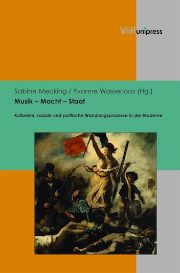Music and politics - a complex relationship
This book accurately analyzes the role of music in social upheavals, historical events and political goals.

What is the relationship between music, power and the state? Does music make the state? Does the state make music? The fact that these introductory questions posed by the two editors of the anthology Music - Power - StateSabine Mecking and Yvonne Wasserloos, by no means only refer to musical practice in fascist or totalitarian states, quickly becomes abundantly clear from the numerous contributions on the subject.
Klaus Pietschmann, for example, examines the courtly music of the early modern period from the perspective of its propaganda effect and symbolism of power. He comes to the conclusion that sacred compositions were sometimes used to pursue a "strategy for the sacral exaltation of the person of the duke", while opera in the 17th century was initially dedicated to the portrayal of a "benevolent ruler", only to be "increasingly placed in the service of a national patriotic identity" in the course of the 18th century. This is also the starting point for Michael G. Esch, who looks at music in the French Revolution, while Sebastian Hansen examines the significance of music in the Napoleonic Wars: "The sounds of battle were also sounds of art", he summarizes, also with reference to Beethoven's Wellington's victory.
In his notes on military music between the founding of the Reich and the Weimar Republic, Manfred Heidler also confirms that military music "always acted as a musical reflection of the respective established socio-political system and its military". Such an intertwining can, of course, also be recognized outside of the military sphere. Sabine Mecking, for example, emphasizes the close connection between singing and nation-building in the 19th century and notes that the "synthesis of monarchy and nation" was also extremely consequential for the singing movement: "Now its forms of representation and expression increasingly went hand in hand with the authoritarian self-portrayals of the monarchical state." As a result, Andreas Jacob observed a "pluralization of lifestyles and musical styles" in the Weimar Republic, which was - initially - short-lived. Volker Kalisch's contribution on music under National Socialism shows the extent to which state power began to interfere in questions of music-making: he examines Goebbels' "Ten Principles of German Musical Creation" against the backdrop of Nazi cultural policy. A significant number of the contributions also deal with the post-war period - they confirm a regained musical pluralism, albeit under different auspices than after the First World War. From discussions on the music policy of the Soviet Union (Kerstin Armborst-Weihs) and various extremely illuminating analyses of popular music by Christoph Nonn, Detlef Siegfried, Carsten Dams and Andreas Kühn to a music-focused examination of the Northern Ireland conflict by Yvonne Wasserloos, the anthology reflects the music phenomenon of power with the power phenomenon of music in a respectable breadth and sometimes with considerable depth.
Music - Power - State. Cultural, social and political processes of change in the modern age, edited by Sabine Mecking and Yvonne Wasserloos, 399 p., € 49.90, V&R unipress, Göttingen 2012, ISBN 978-3-89971-872-0








